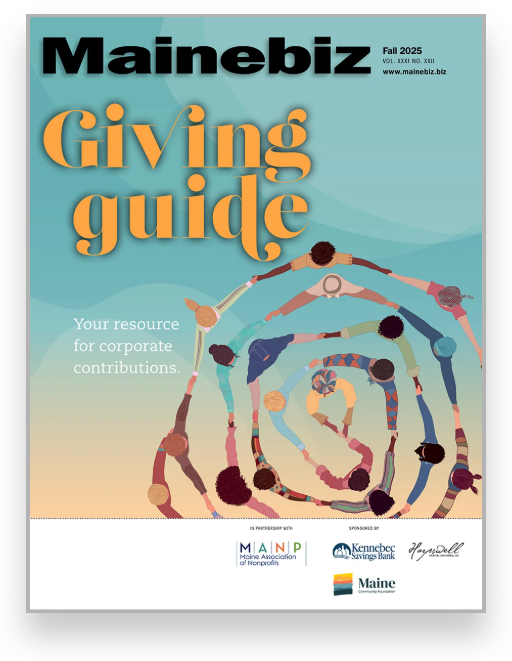
Processing Your Payment
Please do not leave this page until complete. This can take a few moments.
- News
-
Editions
View Digital Editions
Biweekly Issues
- October 20, 2025
- October 6, 2025
- September 22, 2025
- September 8, 2025
- August 25, 2025
- August 11, 2025
- + More
Special Editions
- Lists
- Viewpoints
- Our Events
- Calendar
- Biz Marketplace
How to quiet your inner critic and rediscover your voice
vI’m about to present at a conference. I’ve done my legwork. Slides polished, visuals ready — everything’s on track to be … Nope. Not gonna say it. I refuse to jinx myself with that word. Speaking it feels like summoning Godzilla’s foot to squash Bambi.

I’m in a long-term war with “perfect.” Maybe you are, too.
My “perfect” is my inner critic dressed up in high heels and lipstick and Spanx — pretending to be helpful while whispering that I’ll never be enough.
Standards of perfection (courtesy of your inner critic)
If “perfect” were a person (mine’s female; yours may differ), she’d have some defining traits — many borrowed from Tara Mohr’s "Playing Big."
- Harsh: quick to pounce on any vulnerability.
- Binary: you’re either brilliant or a disaster — never in between.
- The voice of reason: “I’m only trying to help,” she insists, oozing fake concern.
- Expert on weakness: “You’re not good at ___,” she hisses, filling in the blank with whatever you most need right now.
- Holder of high standards: she wants your “best” but never lets you reach it.
- Talented mimic: she can sound like your mom, your ex or Aunt Eunice.
- The voice of hesitation: “You’re not ready! You need more time, more credentials, more everything.”
- The body critic: too old, too young, too weird. Never enough.
- Her favorite trick: if you procrastinate, she calls you lazy; if you act, she mocks your results.
The high cost of impossible standards
When “perfect” runs the show, authenticity leaks out. I’m scanning for a map that only she can read, terrified of a wrong turn. Fun becomes impossible — even in joyful moments. “Perfect” drains energy faster than any workload ever could.
Perfectionist = the stickler saboteur
Those who know Shirzad Chamine’s Poositive Intelligence model recognize “perfect” as the judge or stickler saboteur. Everyone has one — especially the people who seem most put-together.
The free saboteur assessment can help you spot which voices are sabotaging your progress. I use this tool constantly in coaching — it’s fast, compassionate and clarifying.
Embracing the ordinary
The School of Life offers a short animation called Why You Don’t Need to Be Exceptional. It’s a gift to those of us who chase excellence until it hurts. The narrator notes that about 20% of us are “super-strivers” — compelled to achieve, win and be remarkable — yet miserable in the process.
Patricia Ryan Madson, a theater professor at Stanford University and author of "Improv Wisdom," urges us to make peace with being ordinary. Her advice: lower your expectations.
Wait — what? Lower them?! That phrase alone makes my inner critic clutch her pearls. But who set those expectations in the first place? Yup — Spanxypants herself.
Whack-a-mole perfection
“Perfect” shows up everywhere. In my training work with medical residents, I hear it constantly: “Interview complete? Perfect!” “Breast exam done? Perfect!”
In a clinical or gynecological setting, that word can sound deeply evaluative — and unintentionally insulting. It’s become the new filler word, the “uh” of the professional world. Time to retire it. And no, “Great!” isn’t an upgrade.
She’s everywhere
Once I started tracking “Perfect,” I saw her fingerprints across entire organizations. Imagine her running your company: relentless, demanding, robotic. She insists we perfect our products, our processes, our productivity — and ourselves. What’s the definition of a completely perfect employee? That’s right. A robot. And you thought the AI revolution was just about efficiency
Putting perfect in her place
So, how do I handle my own internal dominatrix? By giving her something she loves: a list. I hand her a new notebook (or a shiny app) and let her make all the lists she wants. She stays busy, perfectly productive and — most importantly — off my case. Until next time.
If you’ve been battling your own perfectionist, take seven minutes to watch Charly Haversat’s TED Talk on "The Nirvana Fallacy." Then, if you’re ready to quiet your inner critic and rediscover your voice, schedule a discovery session with me.
Because sometimes the most courageous thing you can do — onstage, on the job or in life — is to let yourself be imperfectly real.
About the author
Kym Dakin-Neal is director of Voice Into Learning LLC and a certified coach specializing in effective communications. She can be reached at kdakin56@gmail.com.
Mainebiz web partners
Related Content

The Giving Guide
The Giving Guide helps nonprofits have the opportunity to showcase and differentiate their organizations so that businesses better understand how they can contribute to a nonprofit’s mission and work.
Learn More
Work for ME
Work for ME is a workforce development tool to help Maine’s employers target Maine’s emerging workforce. Work for ME highlights each industry, its impact on Maine’s economy, the jobs available to entry-level workers, the training and education needed to get a career started.
Learn More
Groundbreaking Maine
Whether you’re a developer, financer, architect, or industry enthusiast, Groundbreaking Maine is crafted to be your go-to source for valuable insights in Maine’s real estate and construction community.
Learn more-
The Giving Guide
The Giving Guide helps nonprofits have the opportunity to showcase and differentiate their organizations so that businesses better understand how they can contribute to a nonprofit’s mission and work.
-
Work for ME
Work for ME is a workforce development tool to help Maine’s employers target Maine’s emerging workforce. Work for ME highlights each industry, its impact on Maine’s economy, the jobs available to entry-level workers, the training and education needed to get a career started.
-
Groundbreaking Maine
Whether you’re a developer, financer, architect, or industry enthusiast, Groundbreaking Maine is crafted to be your go-to source for valuable insights in Maine’s real estate and construction community.
ABOUT
NEW ENGLAND BUSINESS MEDIA SITES
No articles left
Get access now
In order to use this feature, we need some information from you. You can also login or register for a free account.
By clicking submit you are agreeing to our cookie usage and Privacy Policy
Already have an account? Login
Already have an account? Login
Want to create an account? Register
Get access now
In order to use this feature, we need some information from you. You can also login or register for a free account.
By clicking submit you are agreeing to our cookie usage and Privacy Policy
Already have an account? Login
Already have an account? Login
Want to create an account? Register









0 Comments